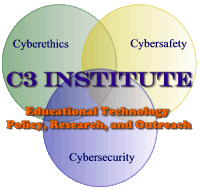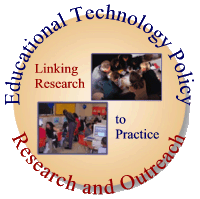

![]()
![]()
![]()
![]()
![]()
![]()
![]()
![]()
![]()
C3™ Institute Goal 3:
Provide professional development opportunities for educators
As our nation continues to build its cyberinfrastructure, it is equally important that we educate our population to work properly within this construct. Not only must they be good citizens from a fair use and “netiquette” perspective, but they must also know best practices in protecting their own data and system, as well as the network and systems on which they work. As in many cases, the best way to reach our citizenry is to teach them within the K-12 environment. Unfortunately, this process is woefully inadequate at present, although many new initiatives show promise. [More]
C3™ Institute Goal 3 Initiatives:
- C3 Conference: The core mission of the C3 Conference is to inform the educational community about the ethical, legal, safety, and security implications of technology use. 2005 included a special emphasis on Cybersecurity, and 2006 includes a special focus on promoting Cyberethics. NSF funding has allowed us to expound upon the role of the IT professional in cybersecurity through scheduled pre-conference workshops. Participants will hear from a number of National Educational Technology and Information and Assurance Technology Experts on topics including Netiquette, Acceptable Use of Computing Resources, Viruses, Hoaxes and Trojan Horses, Backing up, Anti-Virus protection and Firewalls, Intellectual Property, Privacy, Security and Safety, Educational Curriculum Options, plagiarism and promoting ethical online behavior. [More]
- C3™ Resource Portal: The C3™ Institute maintains a portal of resource links to organizations, curricula, list serves, forums, papers, articles, surveys and much more related to Cyberethics, Cybersafety and Cybersecurity. [More]
- C3 Blog: This space provides a location to expand our communal knowledge base for educators related to Cyberethics, Cybersecurity and Cybersafety (C3). Please contribute to the Cyberawareness blog (click on the Comments hyperlink under the Terminology post) as you find new things to add to our communal knowledge base related to C3.
- Interactive Cyberawareness month calendars: Setting your clocks forward or back for Daylight Saving Time and replacing the batteries in smoke detectors are rituals repeated every spring and fall. Similarly, April and October are good times to remind ourselves about Cyberawareness issues. C3™ Institute continues to plan a month’s worth of activities twice a year (April and October) to help promote the K-20 community’s awareness of cyber related issues and encourage safe online practices. Both an interactive calendar and a printable version are available. You can also print out Student Recognition forms for your class. [More]
- TappedIn Monthly Discussion Forum: The C3™ Institute leads a monthly discussion on various topics related to Cyberethics, Cybersafety and Cybersecurity the first Monday of each month at 8:00 PM Eastern Standard Time. Past transcripts of discussions can be found in the TappedIn archive room. [More]
- C3 Course: EDUC 473/698T, Cybersafety, Cyberethics and Cybersecurity (C3) for Educators: Ethical and Legal Implications for Classroom Technology is offered to both pre-service and in-service educators (teachers/administrators/tech coordinators/media specialists) each winter and summer sessions. The course is worth 3 credits from the University of Maryland, and is delivered online. [Learn more about the course syllabus, outline, past student work and evaluations]
- C3 Workshops and Modules: A variety of C3 workshops and modules have been developed for pre-service and in-service educators, and are continually updated for current information and hot topics of interest. University of Maryland or MSDE (1-3) credits are possible. Workshops are modified to fit any specified time frame and are delivered by C3? Institute personnel experienced in C3. In addition, free self paced online tutorials for students and faculty on the basics of C3 have been developed. [More]
- Research: The C3™ Institute has been actively engaged in studying the issues, problems, and relationships associated with Cyberethics, Cybersafety and Cybersecruity in the K-16 setting. Specifically, we have done extensive work exploring the perceptions, conceptualizations and practices of teachers and students in regards to C3 content and have developed a database of case study scenarios.
| Copyright © 2007 Educational Technology Policy, Reserach, and Oureach, Inc. http://www.edtechpolicy.org dpruitt@umd.edu |
 |